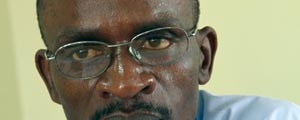
WORLD attention for the next two weeks turns to Warsaw. Sometimes, wading through the acronyms, decoding the United Nations Framework Conference for Climate Change (UNFCCC) arcane can often culminate in confusion and paranoia. By Wisdom Mdzungairi
Going green, reducing carbon-footprints and pledging commitment to the Kyoto Protocol (KP) are top of the agenda at the UNFCCC, 19th Conference of the Parties (COP19) in Warsaw, Poland. From Africa’s perspective COP19 should be an implementation COP.
For key decisions were taken starting from Copenhagen to Durban through Doha. So this is the time, should we say, to show real implementation on the ground.
Environment, Water and Climate minister Saviour Kasukuwere, who will attend for the first time since his appointment two months ago, should know that its success is as much about the atmospherics as it is about the concrete outcomes.
It must set the stage and must deliver a clear timeline for discussions up to 2015, build on the positive and constructive energy of Cancun, Durban and Doha.
Kasukuwere’s presence should give Zimbabwe an opportunity to weigh in on the debate about the economic future of not only the continent, but the country. A Climate policy comes into play and so is an international climate regime.
Since Copenhagen, annual political scenarios have developed ahead of the COPs.
Perhaps, this informs an understanding of the political space available and the range of outcomes on the table, as well as the hotspots which can flare up at the grand finale. These scenarios aim to provide meaning amidst the noise.
- Chamisa under fire over US$120K donation
- Mavhunga puts DeMbare into Chibuku quarterfinals
- Pension funds bet on Cabora Bassa oilfields
- Councils defy govt fire tender directive
Keep Reading
However, in order to look to the future, one needs to assess the past. Doha resulted in a few significant outcomes which will impact Warsaw.
First, the process was streamlined. The KP and the unattractively named Long-term Cooperative Action track (LCA) were both completed. Many observers and parties cheered after slogging away for years over these talks.
As can be anticipated, a COP would not be a COP without a few curveballs. The gaveling through Russian, Ukraine and Belorussian objections to decisions under KP had ramifications for subsequent negotiations earlier in the year.
The stubborn refusal to seek compromise meant discussions on the Loss and Damage negotiations got waylaid.
Loss and Damage, established in Cancun, Mexico, is an attempt to understand and address the residual impacts of climate change once mitigation and adaptation is taken into account.
In addition, to these hangovers from Doha the question of finance was also incomplete.
The tussle in the last 24 hours on Loss and Damage distracted political energy away from the quest to secure a pathway to the $100 billion promised in Copenhagen.
It is assumed this year, developing countries won’t take no for an answer.
So what is there to watch out for in Warsaw? Developing countries are drumming up support for developed nations to inject a $100 billion into the Green Climate Fund by 2020.
Global warming and climate change signs continue to manifest locally and across the world from droughts, the melting sea ice in Greenland to flash floods.
The phenomenon has no boundaries.
Locally, rainfall events are getting more intense and that is consistent with the theory of climate change and global warming; that is an observed trend and that has very important implications for the way that we manage a whole lot of things in the country.
It is all about sustainable living to ensure the world does not reach the dreaded 3˚C mark.
It is however, unlikely that Warsaw will break out into a spurt of ambition. For many countries, they are still operating on the red lines crafted in Copenhagen – the last time serious political attention was given to these talks.
Bringing together decisions makers in the real-economy, the negotiations and in global politics via Heads of State/government will be essential if 2015 is to result in a meaningful outcome on energy, food, resources, manufacturing, urbanisation and security agendas, but to name a few.
In addition, the political dynamism which is shaking up the country groupings will continue to evolve.
Divergences of opinions within country groupings, and the breaking down of the north-south divide will become more evident as we move towards 2015, and countries mature in how they view climate as part of their national interest debate.
Despite the intense shuttle diplomacy throughout and after Bonn, the Kazakh, Ukrainian and Belorussian question still remains unresolved and Russia appear to have been placated.
African Group of Negotiators chair Tosi Mpanu Mpanu told me last week finance, a casualty from Doha needed some resuscitation if countries are to begin to restore trust for 2015.
Key to securing a successful outcome for many will be progress on pre-2020 ambition – a crucial priority for vulnerable countries seeking more systematic concrete greenhouse gas reductions before the 2015 agreement comes into effect.
Different interpretations for who is responsible for reducing emissions before 2020 prevail, as well as what the UNFCCC can do to incentivise this is also diverse.
Can the discussions under the Montreal Protocol help to provide impetus? Addressing the unavoidable impacts of climate change will be challenging.
There is no doubt that reference to compensation will cross many red lines of countries which have significant emissions, not only the US, but China.
Countries should walk out of Warsaw under no illusion that they need to go back home and start preparations for developing their post-2020 offer.
It is essential that leaders come to the table with their ranges and offers for the 2015 agreement at the impending UN secretary-general Ban Ki-moon summit.
No one expects these offers to be set in stone, but unless informal discussions take place between critical countries, not only major emitters –a sense of fairness and ambition is unlikely to be achieved in time for 2015.











